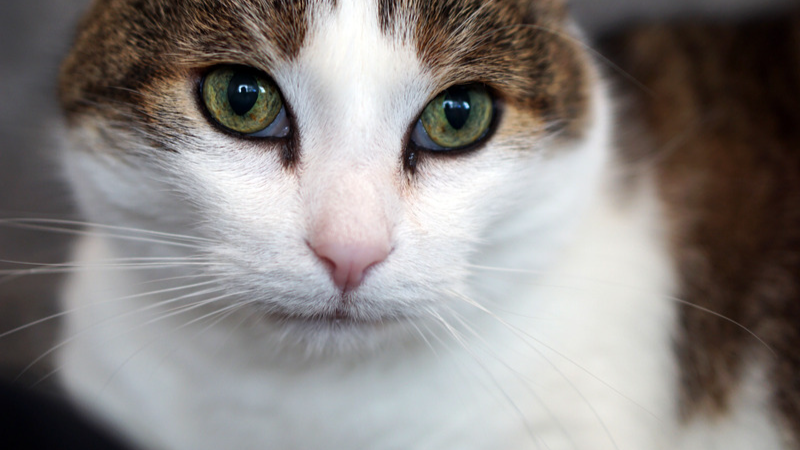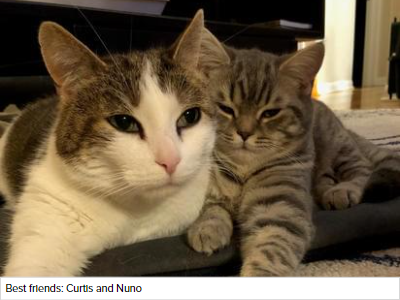
My cat Curtis died peacefully at home on January 17th, 2023. His health had been getting worse for weeks and we knew he wasn’t getting better. He lived with kidney disease for five years, and cancer for one. Instead of bringing Curtis to the vet, we made an appointment with a veterinary service that performs euthanasia at home.
Curtis was a part of my life for fifteen years. I adopted him from a shelter when he was about two years old, and I was twenty-one. He was quite a character. Smart, too. He could open the fridge, which is not a good character trait (my opinion) in a cat. More on that later.
Losing a pet isn’t easy and booking that appointment can be monumentally difficult. If you’re reading this blog because you think your pet is nearing the end of their life, I’m sorry. If you’re here because you’ve already said goodbye, I’m sorry.
Is it time to euthanize my dog or cat?
The decision to euthanize is a reality we must accept as pet owners. If your pet has a terminal illness like cancer or kidney disease, euthanasia could be a consideration in the back of your mind for months. It could also be sudden and unexpected.
In my case, I knew Curtis was getting worse. He had stopped eating dry food, slept constantly, and would yowl before drinking water. Those are all undeniable indications of pain, but we still thought he had months to live. The denial was real.
What made us realize he had days, not months? Looking at a quality of life assessment and realizing that the humane thing to do was end his suffering.
If you’re considering whether it’s time, ask yourself these questions:
- Has my pet’s behaviour changed?
- My pet has an incurable disease. Are they showing late-stage symptoms?
- Is my pet avoiding other pets in the household or acting aggressively?
- What does my vet recommend?
Missing the signs is easy when they are gradual. Think back a few months. Look at pictures. Has their fur changed? Have they lost weight? I looked at photos of Curtis from the summer and thought: “Wow, he was fat!” But no, he was a healthy size then and an unhealthy weight now.
Watch videos. Were they jumping on top of a bookshelf, and now they only jump on the couch?
Write a list of your pet's favourite things to do. If they aren’t enjoying those things anymore, their quality of life is deteriorating.
Here’s Curtis’s list of favourite things to do:
- Eat
- Look out the window and lie in the sun
- Play with Nuno (our other cat)
- Eat
Euthanasia at home – is it right for you?
Curtis hated going to the vet. He hated it so much that he needed sedation for regular checkups. I didn’t want his last life experience to be at the place he feared most. Luckily, I live in a city where there’s a veterinarian service that provides at-home euthanasia.
I knew for a long time that at-home euthanasia is what I wanted for Curtis, but that doesn’t mean it’s the best decision for you.
Take time and really think about how your home will feel during and after the experience. Does the thought of having your pet taken away from your house fill you with apprehension or comfort? Do you worry that your pet will struggle if they’re at home, or will they be more relaxed?
Every person and every pet is different, so it’s important to decide what is right for your family. If you aren’t sure what to do, speak to your veterinarian or a registered veterinary technician.
5 Advantages of euthanasia at home:
1. Comfort
Your home is a comfortable and familiar setting. Removing the need to drive to a clinic could reduce your pet's suffering, especially if movement causes more pain.Your pet can die comfortably in their favourite place to sleep. I chose to have Curtis in my lap.
2. Emotional benefits
At home, you and your family can say goodbye in a more intimate setting. Additionally, your pet doesn’t need to go through the stress of transportation. Driving home without your pet is heartbreaking.For some people, it’s easier to watch their pet get carried away from home instead of leaving them behind.
3. Privacy and time
On top of the emotional benefits, you can say goodbye in privacy. You can take your time, each family member can have a moment alone, and there won’t be strangers around watching you cry.
4. Transportation
Not everyone has easy access to a car. You or your pet may have mobility issues. If your dog is seventy pounds and you can’t lift him alone, transportation could be a difficult and traumatic task.
5. Other pets
If you have more than one pet, they won’t understand what’s going on if their friend just… never comes back. I know more than one person whose other dog wouldn’t stop searching the house or yard for months.Having your other pet present to experience the sounds and smells throughout the process could be helpful for them. However, it is difficult to predict how one pet will react to the death of another.
4 Disadvantages of euthanasia at home:
1. Emotional distress
For some people, having their pet pass away on a specific piece of furniture could be more traumatizing in the long run. If you’re afraid that your couch will be associated with the death of your pet forever, it might be better to take them to the clinic.
2. Lack of support
You might not have a large family and are the type of person who needs lots of people around when you’re upset. At a clinic, staff are trained to emotionally support and guide you when it is time to say goodbye.
3. Timing and availability
If your pet is critically ill or in immediate distress, it could be inhumane to wait for a veterinarian to come to you. Appointments are typically made a couple of days in advance. If your pet is having seizures, trouble breathing, or showing other life-threatening signs, you shouldn’t wait.
4. Cost
It is usually more expensive compared to in-clinic euthanasia. The price range will depend on the weight of your pet, the availability of the veterinarian, or your location.
Grieving your pet is normal
 Grief is weird. Before Curtis died, I would yell, “BYE CATS!” whenever I left the house. Now I just half-heartedly say, “bye Nuno” to our remaining cat. It’s one of those little things that remind me he’s not around anymore. Who knew something so simple could make me so emotional?
Grief is weird. Before Curtis died, I would yell, “BYE CATS!” whenever I left the house. Now I just half-heartedly say, “bye Nuno” to our remaining cat. It’s one of those little things that remind me he’s not around anymore. Who knew something so simple could make me so emotional?It’s not unusual for the house to feel empty because you know your pet will never be there again. The loss can be overwhelming; moving on can feel unattainable. Be kind to yourself. Things around the house will remind you of your pet, so try and think of happy memories. I look at the spot where Curtis used to lie in the sun for hours and smile because that was one of his favourite spots to be.
Guilt
You might feel guilty, and that’s normal too. Be honest with yourself about why you feel guilty. Do you worry that you didn’t do enough for them when they were sick? The decision you made was one of love.In the days following Curtis’s death, I repeatedly said: “I should have done this sooner! Why didn’t I see how much pain he was in before??” The truth is I couldn’t see because I was in denial about how sick he was.
Ultimately the outcome would have been the same. Curtis may have lived a few days longer than he should have, but he is no longer suffering and that’s what’s important.
You are human. Should’ve, could’ve, or would’ve thoughts aren’t helpful. We all cope with loss differently and learn to live with that loss differently too. If you’re feeling lost, ask your vet team about local and online resources. Or consider the list below.
Support Resources:
- Family and friends
- Resources through your local animal shelter
- Counsellors or therapists
- Online resources: OVC Pet Trust.
Celebrate your pet!
As I said above, everyone deals with loss differently. Your pet was awesome! They had a unique personality, and there are so many ways you can honour and remember them. Just do a Google search and you’ll find an endless list.Here are a few ideas:
- Conduct a memorial service
- Commission a custom pet memorial from Etsy – watercolour portraits, keychains, pillows, grave markers, and blankets. You name it, Etsy’s got it!
- Donate money or volunteer at a pet shelter to honour your pet
- Donate money to a veterinary charity
- Dedicate a park bench in their memory
- Plant a tree in their honour
In Closing
I mentioned Curtis’s ability to open the fridge at the beginning of this blog. So, if you’re still wondering about the pitfalls of having a cat who can open the fridge, here’s a tip: don’t put a whole raw chicken on the bottom shelf to thaw. Your cat will open that fridge and try to drag away an entire raw chicken. This actually happened, and it’s a story I love to tell.
Sunset Veterinary Care in Winnipeg was recommended to me by Petsecure’s veterinary medical director Dr. Colleen Fisher. Every single step along the way they were empathetic and caring. I can’t say enough good things about my experience. If you are considering at-
home euthanasia, talk to your veterinary team to see what’s available in your area.
Petsecure covers costs associated with cremation or burial if your pet dies from an accident or illness. Learn what’s covered by Petsecure here, and get a free quote today!
*Lap of Love, the OVC Pet Trust, ETSY, and Sunset Veterinary Care is for information purposes only. Petline Insurance Company does not endorse their services or recommend them to anybody.

.png)